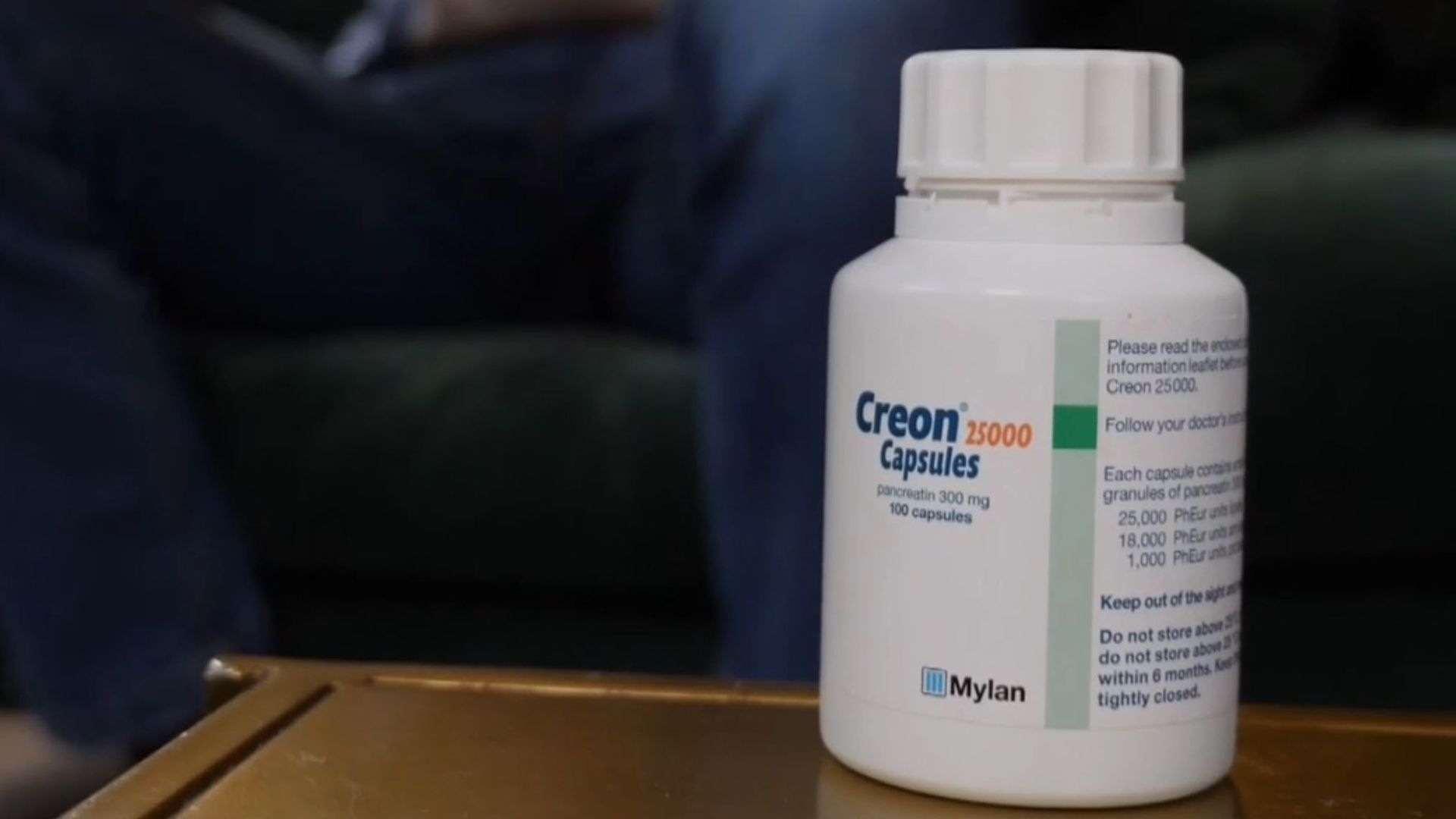Wes Streeting says he is “extremely sorry” patients who need medication for pancreatic insufficiency are being affected by shortages.
The health secretary said global supply chain issues were proving “a hell of a challenge” and acknowledged there is “often a huge amount of anxiety as your prescription’s coming up for renewal”.
Pancreatic Cancer UK has warned shortages of the drug Creon could last until at least 2026, affecting an estimated 61,152 people.
But what is Creon, what does it treat and how is the shortage affecting people?
What is Creon?
Creon is the most popular brand of pancreatic enzyme replacement therapy (PERT), along with Nutrizym and Pancrex.
PERT provides the enzymes people with exocrine pancreatic insufficiency (EPI) need to absorb nutrients, essentially allowing them to digest food, because their condition means their pancreas isn’t able to break down proteins, fats and carbohydrates as it should.
The medication comes in tablet form and can be taken with most food, including meals, snacks, and milky drinks.
There is no set dose of PERT. Patients are encouraged to take as much as they feel they need to comfortably digest their food.
This can be a lot, because Creon capsules can contain between 3,000 and 36,000 enzyme units, and healthy pancreas would normally make up to 720,000 units for a small meal, according to Pancreatic Cancer UK.
Pancreatic cancer patient Dan Godley, 31, previously told Sky News he would take up to 15 tablets with one meal.
Please use Chrome browser for a more accessible video player
Who is affected by EPI and how?
EPI can be brought on for no obvious reason, according to the NHS, but is also commonly caused by acute or chronic pancreatitis, pancreatic surgery, cystic fibrosis, pancreatic cancer, gastric-bypass surgery or coeliac disease.
Less common causes include diabetes, untreated celiac disease, inflammatory bowel diseases and HIV.
The symptoms of untreated EPI can be food not being absorbed properly and going “straight through” the small bowel into the colon, often causing diarrhoea, wind, cramps and bloating.
This can lead to weight loss and in severe cases malnutrition, because the body is unable to get enough fat-soluble vitamins, and in some cases people may eat less than they need to avoid getting uncomfortable symptoms.
It can also lead to low bone mass, weakness of the immune system, and increased risk of cardiovascular events like heart attacks and strokes. For children, it can also cause problems with growth.
People with pancreatic cancer may become too unwell to have surgery – the only way to potentially cure the disease – and may be less able to tolerate treatments such as chemotherapy, according to Pancreatic Cancer UK.
Why is there a shortage?
The Department of Health and Social Care (DHSC) says the Creon shortage, which has been ongoing for more than a year, is down to supply issues caused by a limited availability of raw ingredients and manufacturing capacity constraints.
Nutrizym has also suffered manufacturing issues and struggled with increased demand amid the Creon shortage, while Pancrex has also been unable to plug the gap.
There have been calls for the government to address the shortage, including from the National Pharmacy Association.
A DHSC spokesperson said the government was “working closely with industry, the NHS, manufacturers and other partners in the supply chain to resolve the impact of these supply issues as quickly as possible”.
Speaking to BBC Breakfast on Friday, Mr Streeting said there were “global supply chain issues” and the UK was working “actively to try and strengthen our supply chain resilience”.
“This is not easy,” he said.
“I just want to say to people who have been affected by these shortages, whether in Creon or other medications, I’m extremely sorry people have been in this position.”
He said there could be a “huge amount of anxiety” for people looking to renew their prescriptions, and said he had seen that in his constituency.
Asked when the supply chain would improve, he said he didn’t want to “over-promise and under-deliver” but added “I hope people will see progress over the course of this year”.
“What I can promise is that we are keeping a constant eye on medicine levels and where shortages are occurring, looking at where alternatives can be put in place for different types of medications, looking at how we can adjust frequency and volume for prescriptions.”
‘I’m always worried about next month’s supply’
A survey of 572 patients by Pancreatic Cancer UK in 2024 found 82% had struggled to obtain their usual PERT prescription on more than one occasion, almost one in five (19%) had frequently gone without taking PERT and 71% were taking a lower dose than they needed or had altered their diet.
73% of those surveyed said their ability to manage their symptoms had become more difficult.
Michael Harvey, 72, from North Yorkshire, has been dependent on PERT since he had successful surgery after being diagnosed with pancreatic cancer in 2017.
“There has been an erratic supply of PERT for the whole time I’ve been on them – over seven years – but it’s never been as bad as it’s been in the last year,” he said.
“It just seems to lurch from crisis to crisis. Every month we put in a repeat prescription with hope more than expectation.
“I’m always worried where the next month’s supply is coming from.”
He said he has typically only received 100 tablets at a time – a three- or four-day supply – rather than his full prescription of 800 tablets, leading him to try changing pharmacies, sometimes driving 20 miles to other towns.
Emmerdale actor Tony Audenshaw’s wife Ruth was diagnosed with pancreatic cancer in late 2015. She had surgery but the cancer returned and she died in April 2017 at the age of 43.
Audenshaw said PERT provided Ruth with “a bit of normality” while she was ill, allowing her “really simple pleasures” like ice cream, which she loved.
He said the fact some people are being denied a bit of extra quality of life is “a massive problem”.
Read more:
GPs agree deal to ‘end 8am scramble’ for appointments
UK faces potential second norovirus wave
Keep up with all the latest news from the UK and around the world by following Sky News
What have suppliers said about the shortage?
A spokesperson for Viatris, marketing authorisation holder and distributor of Creon in the UK, said: “We were notified by our third-party manufacturing partner, Abbott, of a global supply constraint of Creon.
“This constrained supply is due to high global demand and reaching maximum manufacturing supply output.”
Some strengths of Creon are available in the UK, they said, adding: “Plans to reduce the constraints and increase capacity are under way.
“During this supply constraint, we hope to be able to supply approximately 90-95% of the average monthly demand for Creon lipase units into the market each month, until this supply constraint is resolved.”
They said distribution of the drug will continue as shipments arrive and Viatris was in “daily” contact with the manufacturer.
Viatris is also in regular contact with DHSC, patient association groups and healthcare professionals, they added.
Be the first to get Breaking News
Install the Sky News app for free
A spokesperson for Essential Pharma said: “We have been working hard with suppliers of raw materials and our manufacturing partners to increase supply of our product as quickly as possible, in order to help patients impacted by the shortages of the other products.
“We are also working closely with the relevant authorities to support these efforts.
“As soon as more Pancrex is available we will work to get supplies to patients through the usual channels as quickly as we can.”
A spokesperson for Zentiva, which makes Nutrizym, said: “Although supplies of Nutrizym 22 remain steady, stock is running out more quickly than usual, leading to temporary shortages.
“Zentiva is working closely with DHSC to manage supplies and minimise disruption. However, the situation is expected to improve only when the market leader’s product returns to full availability.”






